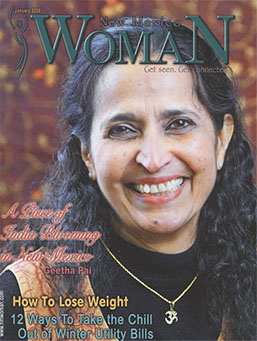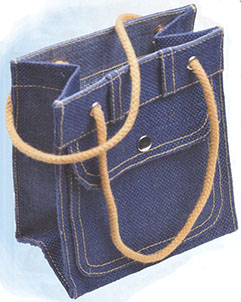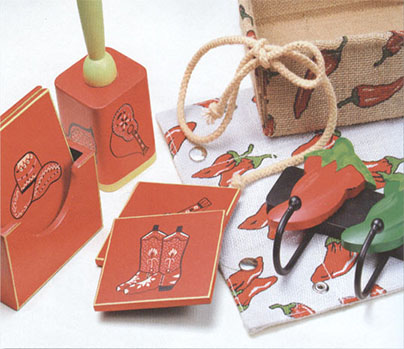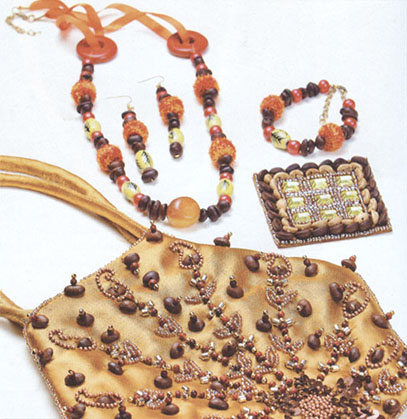Baskets-n-Bags In The Media

A Piece of India Blooming in Southern New Mexico
By Karyth Becenti, New Mexico Woman, January, 2008
When Geetha Pai and her husband came to the United States more than 30 years ago, all they had with them were two suitcases and $16. Their "home" was a patient room at St. Luke's Hospital in Philadelphia, where Geetha's husband was doing his medical internship.
Today, a bit of India blooms in the southern New Mexico Desert in a shop Geetha started in Las Cruces, called Baskets-n-Bags.
Baskets-n-Bags specializes in all kinds of items from Geetha's former homeland including, as the name implies, hand-screened jute, cotton, and non-woven bags, and innovative collapsible jute baskets. But Geetha has gone beyond the bags to include many unique items in her catalog: fashion bags, napkin rings, items made from water buffalo horn, and functional kitchen items ranging from tablecloths to potholders, aprons, and towels. From Bali, Geetha imports pieces of home decor, including large vases, lamps, and terracotta candles.
Geetha also sells beautiful Indian garb -- from silk, cashmere, and pashmina shawls, to wool shawls, jackets, and hand-beaded purses and shawls. She also thinks "green" in offering eco-pens, which are made from recycled cardboard and recycled plastic. Any name can be custom printed on the pens, making them a popular and eco-friendly giveaway for businesses.
Geetha does business with both national and international companies today, but in 1964, when she first moved to the United States, she was learning first-hand how essential jobs are for survival. Her husband, Dr. Vittal Pai, was earning $75 every other week as a hospital intern, but Geetha could not work because of her visa status -- unless she went to school. So, she took a secretarial course and started working at Albert Einstein Hospital in Philadelphia. Soon after, Geetha and Vittal were blessed with their first child, Deepak. But because Deepak arrived prematurely, he was placed in an oxygen tent. Because doctors did not know then about the repercussions of over-oxygenation, Deepak's sight was reduced by 80 percent. The oxygen had caused his retinas to degenerate.
By Karyth Becenti, New Mexico Woman, January, 2008
When Geetha Pai and her husband came to the United States more than 30 years ago, all they had with them were two suitcases and $16. Their "home" was a patient room at St. Luke's Hospital in Philadelphia, where Geetha's husband was doing his medical internship.
Today, a bit of India blooms in the southern New Mexico Desert in a shop Geetha started in Las Cruces, called Baskets-n-Bags.
Baskets-n-Bags specializes in all kinds of items from Geetha's former homeland including, as the name implies, hand-screened jute, cotton, and non-woven bags, and innovative collapsible jute baskets. But Geetha has gone beyond the bags to include many unique items in her catalog: fashion bags, napkin rings, items made from water buffalo horn, and functional kitchen items ranging from tablecloths to potholders, aprons, and towels. From Bali, Geetha imports pieces of home decor, including large vases, lamps, and terracotta candles.
Geetha also sells beautiful Indian garb -- from silk, cashmere, and pashmina shawls, to wool shawls, jackets, and hand-beaded purses and shawls. She also thinks "green" in offering eco-pens, which are made from recycled cardboard and recycled plastic. Any name can be custom printed on the pens, making them a popular and eco-friendly giveaway for businesses.
Geetha does business with both national and international companies today, but in 1964, when she first moved to the United States, she was learning first-hand how essential jobs are for survival. Her husband, Dr. Vittal Pai, was earning $75 every other week as a hospital intern, but Geetha could not work because of her visa status -- unless she went to school. So, she took a secretarial course and started working at Albert Einstein Hospital in Philadelphia. Soon after, Geetha and Vittal were blessed with their first child, Deepak. But because Deepak arrived prematurely, he was placed in an oxygen tent. Because doctors did not know then about the repercussions of over-oxygenation, Deepak's sight was reduced by 80 percent. The oxygen had caused his retinas to degenerate.

For Vittal's medical residency, the young couple moved to Rhode Island, where they moved with their baby son into a small attic. Geetha could not afford a baby sitter, so she found an opportunity to be a language instructor for the Peace Corps, teaching Indian languages to volunteers going to India. "For the Peace Corps, I went to California with my son and lived there for two to three months at a time for different programs in different locations," she says. "I lived in Hemet, Cal Poly, Davis, and Fresno. This gave me great experience to talk, teach, and learn from Americans my own age."
The Pais' student visas expired as soon as Vittal finished his residency. Because Geetha knew that her son would not have the visual accommodations he would need in India, she pleaded with immigration officials to be allowed to stay in the United States. She was issued a green card, after which the Pais moved to Boston, where her husband found a job as an ear, nose, and throat surgeon. It was in Boston that Geetha's second son, Sunil, was born. The Pais remained in Boston for three years.
In September 1974, they moved to Las Cruces, where the children grew up. Deepak moved out to complete his undergraduate work at the University of California, Berkeley, and completed his law degree at Stanford. Despite his disability, Deepak graduated at the top of his classes with honors. Deepack is now working at the Securities and Exchange Commission in Washington, D.C., where he lives with his wife and two young daughters. The second son, Sunil, is a physician, board certified in both family practice and holistic medicine. He recently opened Sanjevani Health and Lifestyle Center in Albuquerque, where he has brought together ancient wisdom from many cultures to offer his clients the opportunity to "rejuvenate yourself."
The Pais' student visas expired as soon as Vittal finished his residency. Because Geetha knew that her son would not have the visual accommodations he would need in India, she pleaded with immigration officials to be allowed to stay in the United States. She was issued a green card, after which the Pais moved to Boston, where her husband found a job as an ear, nose, and throat surgeon. It was in Boston that Geetha's second son, Sunil, was born. The Pais remained in Boston for three years.
In September 1974, they moved to Las Cruces, where the children grew up. Deepak moved out to complete his undergraduate work at the University of California, Berkeley, and completed his law degree at Stanford. Despite his disability, Deepak graduated at the top of his classes with honors. Deepack is now working at the Securities and Exchange Commission in Washington, D.C., where he lives with his wife and two young daughters. The second son, Sunil, is a physician, board certified in both family practice and holistic medicine. He recently opened Sanjevani Health and Lifestyle Center in Albuquerque, where he has brought together ancient wisdom from many cultures to offer his clients the opportunity to "rejuvenate yourself."

Geetha is very proud of her family, coming as they had from the days of living in a patient room, eating in the hospital cafeteria. Before starting the basket shop, she also owned Indian restaurants in Las Cruces and Denver, and was ahead of her time, serving innovative, and all natural, preservative-free meals. After being certified at the University of Arizona as a food canner, she started Geetha's Gourmet, with products in more than 800 stores across the U.S., which she closed to the extreme competition for product placement in stores.
Geetha is still very involved in cooking. She says she will conduct healthy cooking demonstrations for any group without charge. She does this because she is committed to showing others that cooking healthy can be done in a variety of styles: Mexican, Indian, Italian, Greek, Mediterranean, Chinese, and Thai. She once cooked six healthy entrees in one hour at a Santa Fe Museum on the Hill demo, and also has done demos for Neiman Marcus and Cost Plus World Market, among others. In addition, she gives talks about the nutritional and medicinal value of spices and how they are used worldwide.
Geetha is still very involved in cooking. She says she will conduct healthy cooking demonstrations for any group without charge. She does this because she is committed to showing others that cooking healthy can be done in a variety of styles: Mexican, Indian, Italian, Greek, Mediterranean, Chinese, and Thai. She once cooked six healthy entrees in one hour at a Santa Fe Museum on the Hill demo, and also has done demos for Neiman Marcus and Cost Plus World Market, among others. In addition, she gives talks about the nutritional and medicinal value of spices and how they are used worldwide.

It was on a trip home to India that Geetha had "a life transforming experience," which she describes on her website. "I saw people who were desperately seeking the bare necessities of life -- those things you and I take for granted as a part of our daily life: food, shelter, water, the ability to raise their children in a healthy environment."
While still in India, she tried to conjure up ways to help these people -- and saw what she needed to see. Geetha explains, "I saw many people in the streets sewing jute bags. I found out that the bags were used as sacks for grains and produce. I got the names of various companies who were involved in the bag production and visited them. They were not interested in speaking with me as I was a woman and did not yet have my own company. Finally, I did get a company to give me a chance. I had made a commitment with four groups of people to make the jute material into gift and fashion bags to sell in the U.S."
This was the beginning of Baskets-n-Bags, founded in 1998. Then, Geetha took it upon herself to visit Juarez, Mexico, and met women who make papier-maché piñatas. She contracted with them to make piñatas for her to sell, and Baskets-n-Bags now sells 600 to 800 piñatas a week to Cost Plus, Disney, and Oriental Trading Co. She continued to travel internationally and has secured contracts with a number of different companies willing to employ women in various jobs to make items for the U.S. market.
A portion of the company's profits is donated to Mother Teresa's Sisters of Charity to aid global causes in Calcutta.
Some of the women who work for Geetha -- stitching bags and making greeting cards from dried plants and flowers -- are able to work at home and still tend to their families. This was important to Geetha, because she wanted that for herself when her sons were born. "I provide all of the materials and instruction for them so they can do this work without having to leave home. They do not have to worry about transportation to a factory, babysitters to look after their children, or about spending money on work clothes. Women are allowed to work according to their own schedules. I work with one artist who is paraplegic and twisted up. He sits in his wheelchair and paints beautiful paintings with his toes."
Baskets-n-Bags is preserving the handcrafted arts of indigenous cultures, while creating a modern, self-sustaining industry that allows people to make a living wage without leaving their villages. Baskets-n-Bags also ensures that child labor laws are strictly enforced. The manufacturing facilities are monitored regularly to ensure that fair trade practices are being upheld, and that the facilities encourage and support diversity in the workplace. Thanks to Geetha, underprivileged women are helped in Mexico, Bali, India, and Nepal.
The environment also benefits. Jute is a truly versatile fiber and one of the most valuable resources in India. The products made from jute are intended to be reusable, biodegradable, and nontoxic to the environment.
Geetha has found the best networking comes from the many trade shows she attends. She has also found membership in a number of organizations to be helpful and has joined the National Association of Women Business Owners, the Southwest Women's Business Enterprise National Council, the Hispano Chamber of Commerce, and the Women's Business Economic Council.
Her story doesn't end there. Geetha says, "I am now 63 years old and still have many unfinished projects. Most importantly, I am grateful that this country has offered me opportunity in the face of adversity. In the U.S., we have so many opportunities available to us. It is important to be able to share our good fortune with those who do not have the means to live in such abundance. To be able to help people by giving them meaningful work that can be passed on to their children, while allowing them to maintain their dignity -- this is what I want for my legacy."
While still in India, she tried to conjure up ways to help these people -- and saw what she needed to see. Geetha explains, "I saw many people in the streets sewing jute bags. I found out that the bags were used as sacks for grains and produce. I got the names of various companies who were involved in the bag production and visited them. They were not interested in speaking with me as I was a woman and did not yet have my own company. Finally, I did get a company to give me a chance. I had made a commitment with four groups of people to make the jute material into gift and fashion bags to sell in the U.S."
This was the beginning of Baskets-n-Bags, founded in 1998. Then, Geetha took it upon herself to visit Juarez, Mexico, and met women who make papier-maché piñatas. She contracted with them to make piñatas for her to sell, and Baskets-n-Bags now sells 600 to 800 piñatas a week to Cost Plus, Disney, and Oriental Trading Co. She continued to travel internationally and has secured contracts with a number of different companies willing to employ women in various jobs to make items for the U.S. market.
A portion of the company's profits is donated to Mother Teresa's Sisters of Charity to aid global causes in Calcutta.
Some of the women who work for Geetha -- stitching bags and making greeting cards from dried plants and flowers -- are able to work at home and still tend to their families. This was important to Geetha, because she wanted that for herself when her sons were born. "I provide all of the materials and instruction for them so they can do this work without having to leave home. They do not have to worry about transportation to a factory, babysitters to look after their children, or about spending money on work clothes. Women are allowed to work according to their own schedules. I work with one artist who is paraplegic and twisted up. He sits in his wheelchair and paints beautiful paintings with his toes."
Baskets-n-Bags is preserving the handcrafted arts of indigenous cultures, while creating a modern, self-sustaining industry that allows people to make a living wage without leaving their villages. Baskets-n-Bags also ensures that child labor laws are strictly enforced. The manufacturing facilities are monitored regularly to ensure that fair trade practices are being upheld, and that the facilities encourage and support diversity in the workplace. Thanks to Geetha, underprivileged women are helped in Mexico, Bali, India, and Nepal.
The environment also benefits. Jute is a truly versatile fiber and one of the most valuable resources in India. The products made from jute are intended to be reusable, biodegradable, and nontoxic to the environment.
Geetha has found the best networking comes from the many trade shows she attends. She has also found membership in a number of organizations to be helpful and has joined the National Association of Women Business Owners, the Southwest Women's Business Enterprise National Council, the Hispano Chamber of Commerce, and the Women's Business Economic Council.
Her story doesn't end there. Geetha says, "I am now 63 years old and still have many unfinished projects. Most importantly, I am grateful that this country has offered me opportunity in the face of adversity. In the U.S., we have so many opportunities available to us. It is important to be able to share our good fortune with those who do not have the means to live in such abundance. To be able to help people by giving them meaningful work that can be passed on to their children, while allowing them to maintain their dignity -- this is what I want for my legacy."
